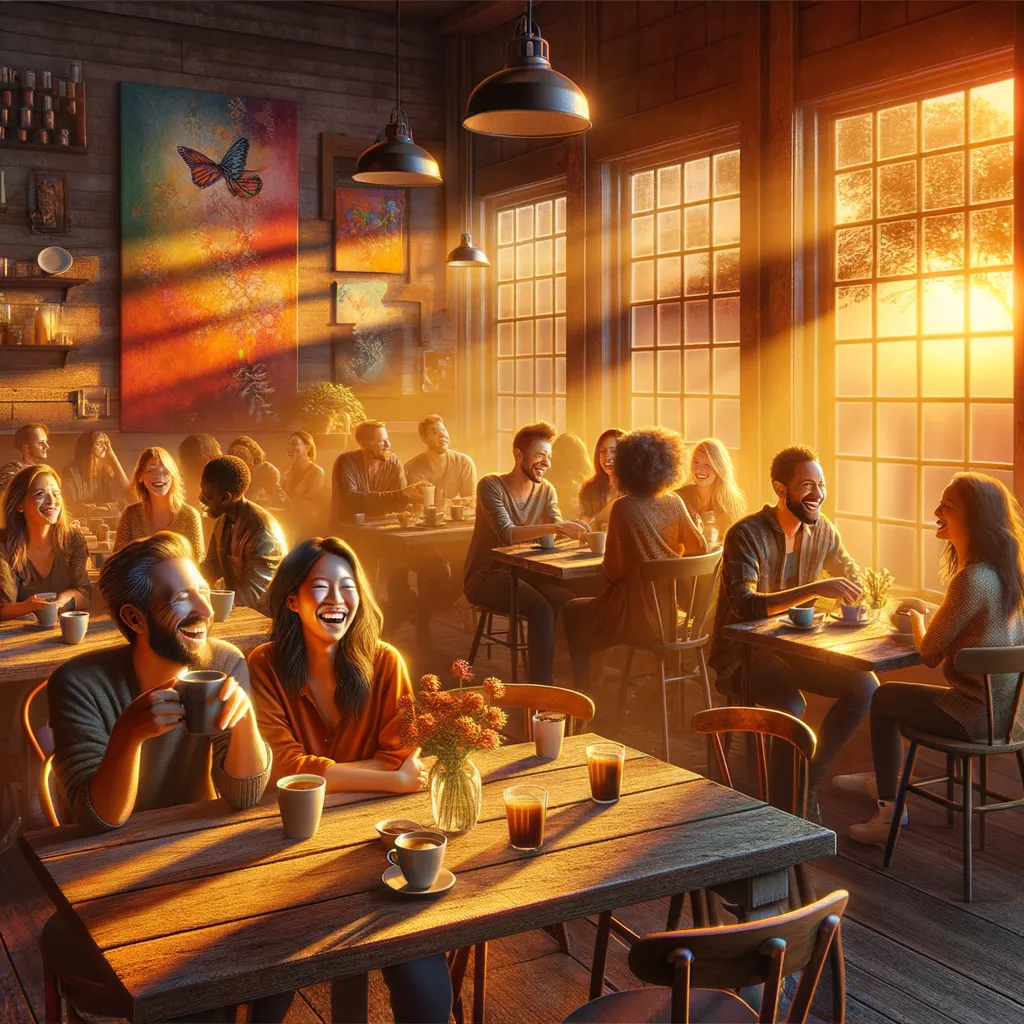Unlocking Joy: The Hidden Language of Laughter
In a quaint café, where the aroma of coffee mingled with the soft hum of laughter, an unexpected revelation began to unfold. As strangers shared spontaneous chuckles, it became clear that laughter was more than mere sound; it was a bridge that connected hearts and eased the weight of solitude. Amidst the joy, however, lay a deeper truth, as one woman’s hollow laughter hinted at unseen burdens, revealing laughter’s dual nature as both a unifier and a concealer. As the sun set, the café transformed into a sanctuary of shared humanity, urging a reflection on how laughter could foster genuine connections and healing. With each subsequent laugh, the realization dawned: embracing this laughter language could unlock a profound understanding of one another, weaving a richer tapestry of community and compassion.
In the memory of April 28, 2008, I found myself in a small café tucked away in a bustling corner of my hometown, a place where the air was thick with the scent of freshly brewed coffee and the soft murmur of laughter danced between the tables. It was an ordinary day, yet the laughter that echoed around me felt extraordinary, as if it held secrets waiting to be unveiled. People gathered in clusters, their expressions brightening with each shared joke, each playful tease a thread weaving connections between strangers. It was here, in this sanctuary of mirth, that I first pondered the idea of a language that spoke only in laughter, a form of communication that transcended words.
As I observed the interactions unfolding around me, I couldn’t help but notice how laughter was more than just a sound; it was a bridge, spanning the chasms of misunderstanding and solitude. Two individuals who had never met before found themselves sharing a spontaneous chuckle over an awkward spill of a drink. In that moment, the world shrank around them, their worries dissipating like the steam rising from their mugs. Laughter painted their interaction with color, infusing it with warmth and possibility. It struck me that perhaps this was the true essence of connection: a shared moment of joy that required no translation.
The café transformed into a stage, and each burst of laughter became an act in a larger play. There was the elderly man in the corner, his laughter rich and deep, reminiscent of a time when the world felt simpler. Nearby, a group of college students erupted in giggles over a shared memory, their eyes sparkling with youthful exuberance. In that space, laughter bridged generations, creating a tapestry of experiences woven together through joy. It was an unexpected revelation: laughter was a universal salve, capable of soothing the tensions of life’s complexities.
Yet, amidst this symphony of joy, I sensed an undercurrent of something deeper. Laughter, while often spontaneous and lighthearted, also held the power to mask emotions that ran far beneath the surface. A woman sat alone at a table, her laughter mingling with the others yet feeling slightly hollow, as if she were performing in a play without a script. I wondered what stories lay hidden behind her smile, what burdens she carried that no one could see. Herein lay the paradox of laughter: it could unite and divide, comfort and conceal, a duality that made the experience of human connection both beautiful and bewildering.
As the afternoon light began to dim, I marveled at how laughter had woven itself into the fabric of the café, binding together strangers and friends alike. It became clear that this laughter language, if it truly existed, was a living entity—a creature that thrived on authenticity and vulnerability. The more we allowed ourselves to be open, the richer the laughter became, transforming into a chorus of shared humanity. It was a reminder that in the act of laughing, we revealed our most genuine selves, however flawed or imperfect.
The café began to empty as the sun dipped below the horizon, but the echoes of laughter lingered in the air like a sweet perfume. I left with a newfound understanding of the role laughter played in our lives—a beacon of hope in times of darkness, a catalyst for connection when words failed us. Yet, as I walked home, I couldn’t shake the feeling that there was more to discover in this laughter language. Could it be that within each chuckle and giggle lay the potential to transform not only our relationships but also the very fabric of society?
That night, as I lay in bed, I found myself reflecting on the moments I had witnessed that day. Each laugh was a small act of defiance against the weight of the world, a reminder that joy could bloom even in the most unlikely of circumstances. I wondered how we might cultivate this laughter language in our own lives, to share it freely and generously with those around us. What if we embraced laughter as a tool for healing, a way to navigate the complexities of our existence?
In the days that followed, I made a conscious effort to seek out laughter, to create moments that invited joy. I discovered that humor had a magical quality, an ability to dissolve barriers and foster understanding. I found myself laughing more, not just with friends but also with strangers, allowing the unexpected connections to blossom. With each laugh, I felt a shift within myself, a growing recognition of our shared human experience.
As I pondered the intricacies of this laughter language, I realized that it was not solely about humor; it was about vulnerability, connection, and the courage to embrace joy amidst life’s uncertainties. It became a lens through which I viewed the world, urging me to approach each interaction with openness and a willingness to share in the laughter, however small.
In the end, I returned to that initial question: if laughter were a language of its own, how might we harness its power to transform our connections and our communities? Could it be the key to unlocking a deeper understanding of one another, a way to bridge the divides that separate us? Perhaps the answer lies not just in the laughter itself, but in our willingness to listen, to engage, and to celebrate the beauty of our shared humanity.
In the sanctuary of laughter, moments of joy become threads that weave together the fabric of connection, revealing the profound beauty hidden within our shared humanity.



